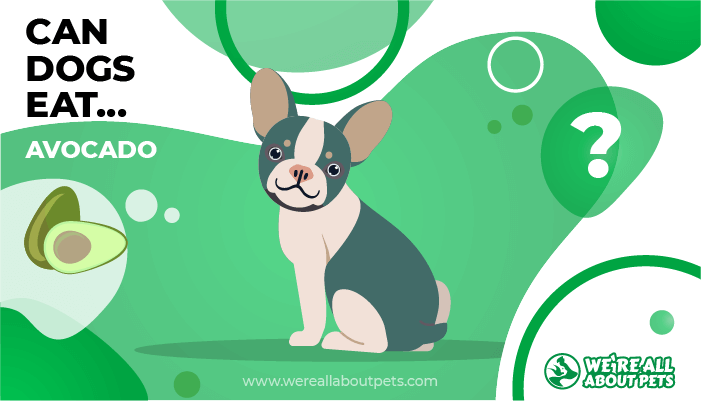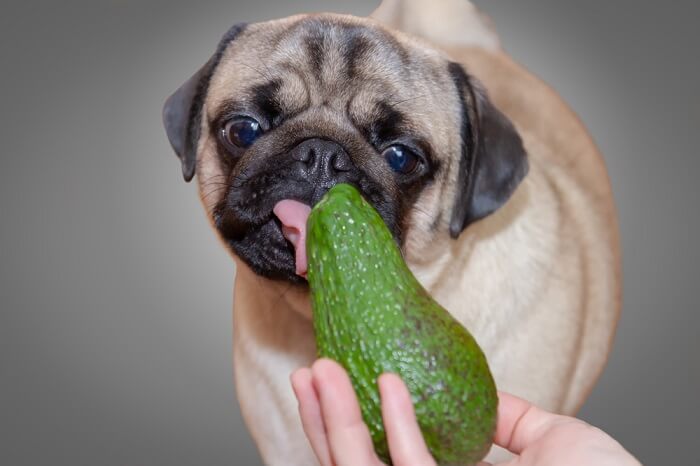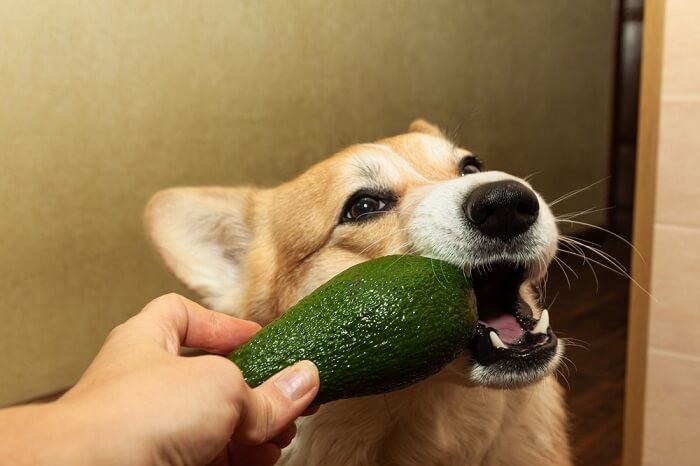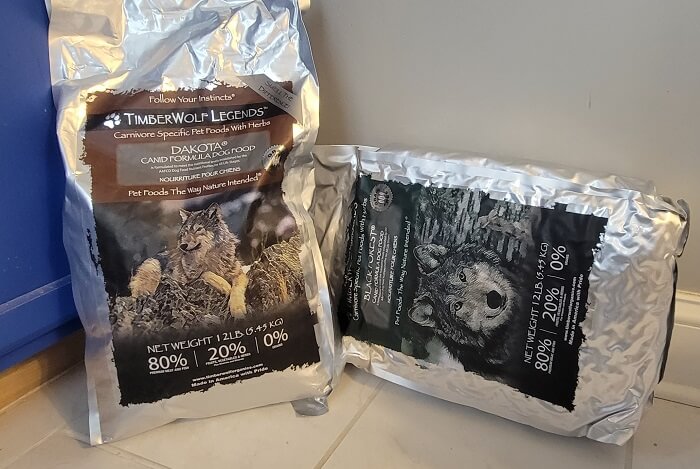Can Dogs Eat Avocados?
This page contains affiliate links. We may earn money or products from the companies mentioned in this post through our independently chosen links, which earn us a commission. Learn More

I may, personally, be the world’s biggest fan of avocados. On a vacation to Mexico, I think I ate my weight in guacamole. But, can dogs eat avocados?
You may see some online sites that say dogs can’t or shouldn’t eat avocados but my dogs would beg to differ. Actually, it’s perfectly safe for dogs to eat some parts of the avocado – but some parts are not safe.
Find out how you can safely give your dog some avocado by reading our short guide.
Avocados Nutrition Stats
One cup of avocados, cubed (150 grams) is considered to be a serving size for a human. High percentages of daily values are noted.
- 240 calories (12% daily value)
- 3 grams protein
- 22 grams fat (34% daily value)
- 3.2 grams saturated fat (16% daily value)
- 12.8 grams carbohydrates
- 10.1 grams dietary fiber (40% daily value)
- Vitamin C 15 mg (25% daily value)
- Vitamin E (Alpha Tocopherol) 3.1 mg (16% daily value)
- Vitamin K 31.5 mcg (39% daily value)
- Riboflavin 0.2 mg (11% daily value)
- Niacin 2.6 mg (13% daily value)
- Vitamin B6 0.4 mg (19% daily value)
- Folate 122 mcg (30% daily value)
- Pantothenic Acid 2.1 mg (21% daily value)
- Magnesium 43.5 mg(11% daily value)
- Potassium 727 mg (21% daily value)
- Copper 0.3 mg (14% daily value)
- Manganese 0.2 mg (11% daily value)
One whole avocado contains about 322 calories.
Avocados Nutritional Facts At A Glance

As you can see from examining the nutrients in the avocado, they have high amounts of multiple vitamins and minerals.
Avocados are a very good source of vitamin C, vitamin K, B vitamins such as B6, folate, potassium, magnesium, and other important nutrients. Avocados have more potassium than bananas. They also provide carotenoids such as lutein and zeaxanthin; phytosterols, omega-3 fatty acids, and beta-carotene.
Avocados are also a good source of dietary fiber to help your dog’s digestive system.
Most of the calories in avocados come from fat but it features healthy fats (monounsaturated fatty acids – MUFAs) so don’t let this deter you from giving the safe parts of the avocado to your dog. Some dog foods such as Avoderm and dog treats include this soft green part of the avocado because these good fats help produce a beautiful, shiny coat and good skin.
Percentage-wise, avocados are made up of 19 percent carbohydrates, 77 percent fats, and 4 percent protein.
Compared to most other fruits and vegetables, avocados do not contain large amounts of sugar.
Can Dogs Eat Avocados?
Yes, dogs can eat the green flesh found inside the avocado. However, you should not give your dog the skin or pit (avocado seed) from the avocado.
The pit, skin, and leaves all contain a substance called persin. Persin is a fungicidal toxin. Low concentrations are generally harmless to humans, though some people can have allergic reactions.
But persin toxicity can have negative effects on animals when it is consumed through the leaves, bark of the avocado tree, or from the skin or pit of the avocado.
Studies suggest that cats and dogs can experience mild stomach upset from eating leaves, bark, avocado skin, etc., that contains persin.
The avocado pit is also an obvious choking hazard. You shouldn’t allow a dog to chew on it or play with it. It’s similar to a small wooden egg and it could easily become lodged in your dog’s throat. If your dog does successfully eat the pit, then it could cause a blockage in the gastrointestinal system.
The high fat content could lead to pancreatitis or, at the minimum, an upset stomach, in some dogs, especially if your dog is already obese.
With all that said, if you peel an avocado and remove the pit or stone, the avocado fruit is safe to give your dog. The avocado flesh is also loaded with health benefits and many dogs love it.
Are Avocados Good for Dogs?

Yes, the green flesh of the avocado is good for dogs. As mentioned elsewhere, some dog food companies add avocados to their dog foods and dog treats because of the benefits of avocado. The healthy fats in avocados are very good for your dog’s skin and coat, for example.
Plus, avocados have many other beneficial vitamins, minerals, antioxidants, and nutrients.
How Much Avocado Can Dogs Eat?
Avocados are very high in fat and they do contain quite a few calories (22 grams of fat and 240 calories per cup). For these reasons, you shouldn’t let your dog make a pig of himself eating avocados.
Remember that treats and snacks should not make up more than 10 percent of your dog’s daily calories. So, if your dog normally consumes 800 calories per day (suitable for many 30-lb dogs), he should not eat more than 80 calories in avocados. That is less than one whole avocado.
How Often Can Dogs Eat Avocados?
If you have a steady supply of avocados, you could allow your dog to have some once or twice per week. Keep in mind that it is possible to eat too much of anything, even good things. Those high calories can put extra pounds on your dog over time. Feeding avocados in too large amounts, even the safe part, could lead to gastrointestinal upset.
If your dog is obese, you might want to consider a different fruit or vegetable as a snack. Look for one that isn’t as high in calories.
The Correct Diet Is Important
Dogs need to eat the correct diet for good health. This means that they require good quality protein and fat. Foods like avocados should only be given as an occasional treat. While there are many different ideas about good dog foods and different ways to feed dogs,
Here your dog needs the following in his diet:
- Good Sources of Protein –All dogs need good sources of animal protein in their diet. Meat, fish, poultry, and eggs are all good sources of animal protein.
- Good Sources of Fat –Fat provides essential fatty acids (EFA) and helps distribute the fat soluble vitamins A, D, E, and K so your dog’s body can absorb them.
- Named Ingredients- Look for named ingredients in your dog’s food and avoid generic ingredients. The more specific the ingredient is, the better. Otherwise, you don’t really know what you are feeding your dog.
- Low to Moderate Carbohydrates- Many dog foods are loaded with carbohydrates. This is true even with some good quality foods. Carbohydrates are not “bad” and they can be beneficial (dietary fiber can come from carbs, for example). But carbs should not be a substitute for protein.
- Avoid Artificial Preservatives, Colors, and Sweeteners- Artificial preservatives and colors/dyes have been linked to some health problems in humans and animals. You should try to avoid these ingredients in dog foods.
- AAFCO- AAFCO is the Association of American Feed Control Officials. AAFCO sets voluntary standards for pet food labeling. Look for foods that have these minimum standards.
- Fresh Water- All dogs need easy access to fresh water unless they are ill or have some other reason to be temporarily kept away from water. For example, if you are house training your puppy, it makes no sense to give him water overnight.
What Are Other Healthy Alternatives to Avocados In A Dog’s Diet?

Avocados are a healthy treat but there are many other fruits and vegetables that can provide some of the same benefits. You should consider these human foods as treats.
Check with your veterinarian if your dog has any health issues and you are concerned about giving any of these foods.
- Apples
- Asparagus
- Bananas
- Bell pepper
- Broccoli
- Brussels sprouts
- Carrots
- Cauliflower
- Cucumber
- Green beans
- Mangos
- Oranges
- Parsnip
- Pears
- Pineapple
- Pumpkin
- Strawberries
- Summer squash
- Sweet potato
- Tomatoes
- Watermelon
- Zucchini
How Do You Give Your Dog Avocados?
Avocados don’t usually benefit from cooking. Cooking can make them bitter. The best way to give your dog an avocado is to peel it and remove the pit. Then cut the green flesh into pieces. You can put the pieces into a small dish for your dog or feed them from your hand.
Avocados oxidize and turn brown quickly after they are sliced so it’s best to give your dog his avocado pieces as soon as you cut them. You could put a little lemon juice on the avocado to prevent the browning but your dog probably wouldn’t like it.
We do not recommend giving your dog guacamole. While guacamole contains lots of avocados, it also contains ingredients such as garlic, onions, and spices which may not be safe for dogs to eat. Stick to plain avocados for your dog.
If you have an avocado tree in your yard (a blessing for some people in California and elsewhere), dogs will sometimes help themselves to the avocados. There are rarely, if ever, any reports of dogs getting sick from eating these avocados but you should keep an eye on your dog in case he has any digestive problems. The biggest concern of dogs eating an avocado is the pit because it is a choking hazard.
Conclusion
Avocados are enormously popular, not just with humans but also with dogs. Many dogs love them. It’s safe to give your dog a small amount of avocado occasionally as long as you remove the peel and the pit/stone.
If your dog should eat an avocado (or several of them) from a tree in your yard, keep an eye on him to see if he has any stomach problems such as diarrhea. The pit or stone in the avocado is the biggest concern because a dog could choke on it.
If your dog is obese of if you have any questions about giving your dog avocados, talk to your veterinarian.








